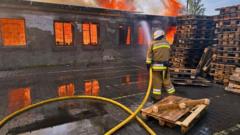With around 10,000 American troops stationed at it, Al Udeid Air Base is a pivotal facility for U.S. Central Command in the Middle East, recently targeted by Iranian missiles. Established post-9/11, this air base has facilitated numerous military operations in the region, including efforts in Iraq and Afghanistan.
Understanding Al Udeid: The Crucial U.S. Air Base in Qatar Under Threat

Understanding Al Udeid: The Crucial U.S. Air Base in Qatar Under Threat
Explore the strategic importance of Al Udeid Air Base after recent Iranian missile attacks, highlighting its role for U.S. military operations.
The American military facility, Al Udeid Air Base in Qatar, became a flashpoint on Monday as it was targeted by Iranian missiles, marking a significant moment for the largest U.S. base in the Middle East. This air base serves as the operational headquarters for the U.S. Central Command, hosting approximately 10,000 troops.
Al Udeid, heavily fortified with sophisticated air defense systems, has been integral to U.S. military strategy since established shortly after the 9/11 attacks. Initially used to deploy jets against Taliban and Al Qaeda forces in Afghanistan, it has evolved into a central hub for various military missions across war zones in Iraq and Afghanistan, as well as for conducting operations against the Islamic State in Syria.
Notably, Al Udeid played a crucial role during the U.S. withdrawal from Afghanistan, assisting in the evacuation of thousands of Afghans and American citizens in 2021. Its Combined Air Operations Center enables the projection of U.S. air power across an extensive geographical area that includes over 21 countries, ranging from Northeast Africa to Central and South Asia, as affirmed by the Air Force.
Qatar built the base in 1996, believing it would foster a strong defense partnership with the U.S., and has since invested more than $8 billion to enhance its capabilities. The base not only supports U.S. operations but also houses command facilities for American special forces and is jointly used by the Qatari military and the British Royal Air Force.
Security measures surrounding the base remained undisclosed until 2013, when then-Defense Secretary Chuck Hagel revealed its location. This transparency did little to deter foreign threats, as demonstrated by the recent missile attack.
During a recent visit to Al Udeid, former President Trump highlighted the base's significance, reflecting on Qatar's military procurement from the U.S. while reassuring troops with light-hearted remarks. The current precarious situation underscores the critical role Al Udeid continues to play in American military posture and strategy in the Middle East amidst escalating tensions.























